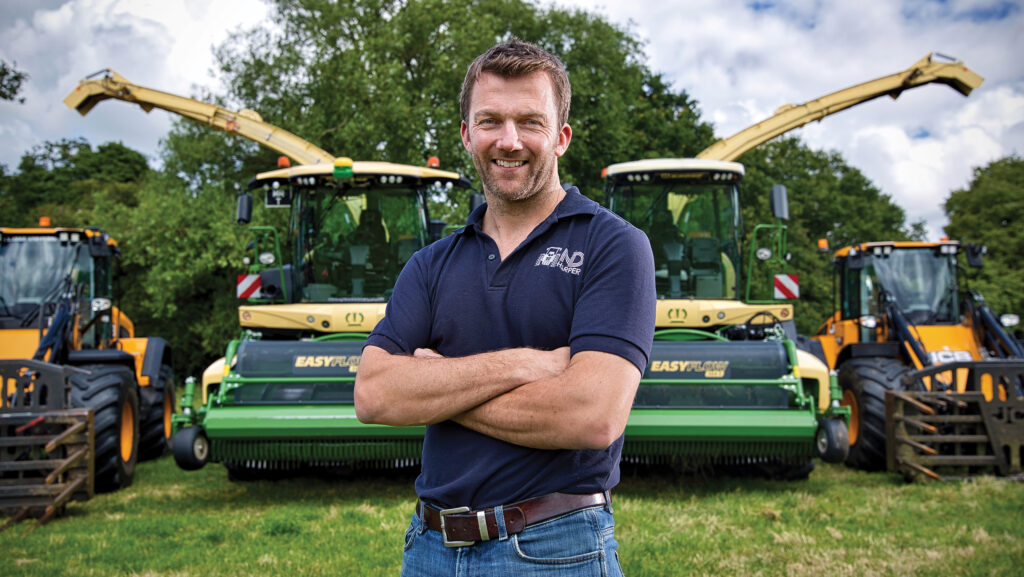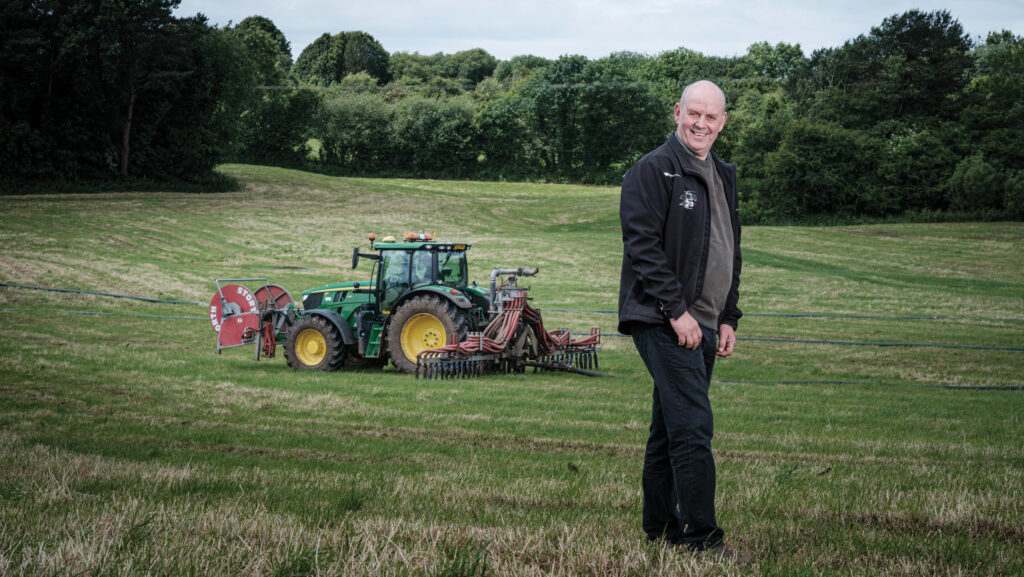Farmers Weekly Awards 2024: Contractor of the Year finalists
 Contractor of the Year finalists (left to right) Tim West, Nigel Harper, Nik Johnson
Contractor of the Year finalists (left to right) Tim West, Nigel Harper, Nik Johnson Carefully calculated costings and ruthless efficiency are the two stand-out commonalities among this year’s Contractor of the Year finalists.
Finalists
- JSE Systems – Wood Lodge, Lincolnshire
- ND Harper – Cross Lanes Farm, Cheshire
- TW West – Whin Bank, Cumbria
The judges
- Jill Hewitt – Jill is chief executive of the National Association of Agricultural Contractors, the industry body that represents contractors across the UK
- Kevin Heywood – Kevin’s Cornish-based business, AJ Heywood & Sons, bagged Farmers Weekly’s Contractor of the Year crown in 2023
- Oliver Mark – Oliver is Farmers Weekly’s machinery editor and has been part of the Contractor of the Year judging panel for the past decade
JSE Systems, Wood Lodge, Lincolnshire

Nik Johnson © Tim Scrivener
Keeping up to 38 staff working efficiently and safely across a territory that stretches from the M25 to the Humber is no mean feat, but it’s one that JSE Systems’ management team has down to a fine art.
Led by owner Nik Johnson, and supported by Joe Hampsey and Bertie Harper, the business spreads 350,000t of biosolids, 25,000t of manure and 20,000t of compost annually, and covers another 40,000ha with ash-based fertiliser.
Though built on the foundations of a contract service started in the 1970s by Nik’s father Les, its transformation started after gaining the Fibrophos fertiliser agency in the mid-1990s and, more significantly, when it took on an Anglian Water biosolids contract in 2006.
See also: What’s in Your Shed? visits FW 2023 Contractor of the Year
This brought its own challenges, with vast amounts of red tape and zero tolerance for mishaps. Not easy with up to 25 seasonal staff to keep the reins on but, thanks to fastidious organisation, it’s a burden the company takes in its stride.
As well as contract spreading, JSE has a fertiliser supply business – selling its products from Cornwall to Orkney – and also offers carting and clamping services for anaerobic digester plants.
Machinery
Careful costings are central to the long-term health of the business, with hours spent formulating a pricing structure that accounts for machinery – maintenance, breakdowns and depreciation – as well as insurance, management and staff.
Biosolids are spread with seven self-propelled Vredos, most of which are owned by Anglian Water, while two twin-axle Bunning Lowlander 230HBDs deal with the muck.
Fertiliser is put through a fleet of five heavily modified Bredal K105s, some of which will throw material to 24m thanks to an in-house-developed spreading system.
Given the corrosive nature of the product they are applying – and the fact that, between them, they might cover 40,000ha a season – each one is stripped to the chassis every winter and given a full health check and rebuild.
This work pays dividends, with some managing up to 10 seasons before being moved on.
Brand loyalty extends beyond Vredo and Bredal, with JCB Fastracs – five 4220s and eight 3230s – a mainstay of the fleet.
Remaining faithful to a single supplier builds trust, means issues are resolved quickly and ensures staff know them inside-out.
Staff and customers
To manage the 13 full-time staff, a ruck of seasonal employees, and some 400 annual customers, JSE developed its own smartphone app that has revolutionised record-keeping.
Employees use it to submit timesheets and conduct tractor and implement checks, the latter via QR codes stuck on every machine. These daily assessments are geo-stamped and timed, meaning managers know they’ve been done when they should, and any faults generate an automatic email to the in-house mechanic.
The app is also used to store any road dispensations and customer maps and contact details – all of which are readily available at any given moment – as well as books of compliance for every machine, training records and health and safety information.
The latter is a cornerstone of the business; rules breaches are not tolerated, and regular, random drink and drugs tests are conducted throughout the year.
Staff are duly rewarded for their efforts, evidenced by the fact that one member of the team has done 42 straight spreading seasons and some seasonal employees have returned for six consecutive campaigns.
In numbers
- 400 customers
- 15 years in business
- 13 full-time members of staff
Business facts
- Primary services offered: Spreading biosolids, compost, muck and fertiliser, plus anaerobic digester plant support services and stone picking
- Main customer base: Arable farms and AD plants
- Area covered: Across eastern England, from the M25 to the Humber
Judges liked
- Exceptionally high work standards
- Rigorous and uncompromising approach to health and safety
- Carefully calculated costings ensure profitability
- Contracting dovetails with fertiliser trading division
- In-house developed app eases management burden
What the judges say
“JSE’s management team runs a slick and professional operation, with impeccable costings and a robust, uncompromising approach to the health and safety of its staff.”
ND Harper, Cross Lanes Farm, Cheshire

Nigel Harper © Richard Stanton
A quality service is the foundation of Nigel Harper’s silage and slurry focused contracting business which, in little more than a decade, has come to dominate swathes of Cheshire’s dairying heartlands.
Such has been the dizzying expansion of the once one-man-band that his team now has an all-encompassing role on dozens of farms, taking care of grass crops from start to finish.
Not bad, given he started out just 12 years ago cold-calling local farmers to tout the services of his hodgepodge fleet of maize drill, buck rake and trailers, despite not having a single tractor to his name.
Rapid growth through the subsequent years has forced him to learn how to be a businessman, head of HR and juggle two mobile phones.
Now, the calls just don’t stop, the machinery fleet has ballooned, and he has outgrown the modest but impeccably tidy yard he calls home.
Though he takes a can-do attitude to opportunities, work is carefully planned to maximise labour and machinery output, ensuring the business always remains profitable and customers get value for money – but never at the expense of quality.
Machinery
The secret to his rapid expansion has been investing in implements rather than engines. The two Krone foragers, which chopped more than 7,000ha last year, are hired from Wilsons Contractors.
This means Nigel knows his fixed costs, doesn’t have to gamble on depreciation, and eliminates breakdown hold-ups, unexpected expenses and warranty disputes.
Similarly, the 14-strong fleet of 165hp to 275hp Case tractors is leased on an hourly rate, avoiding tying up cash in power units.
Instead, that money can be spent on implements, which hold their value better than anything with an engine and have a greater impact on output and quality of work.
They are looked after too, which keeps the gap between purchase price and trade-in as small as possible.
While any equipment deemed fundamental to weather-pressured work – foragers, tractors and grass implements – is kept new to maximise reliability, the expensive, self-propelled equipment Nigel does own is bought second-hand, including two loading shovels, the sprayer and a combine.
Staff and customers
One of Nigel’s biggest customers is himself, having taken on 400ha of his own land to milk 750 cows with 250 followers.
But he works almost as closely with the rest, with relationships more akin to partnerships than service offerings. He shares advice and knowledge with them, knows their fields as well as they do, and considers jobs more than just a diary booking.
Investing in software has been transformative, with operations and timesheets managed through AgDrive’s smartphone app, and Xero Figured producing cashflow projections to help keep the books balanced and assess opportunities for expansion. Invoices are sent out twice a week to keep the money moving.
Several employees have been with the business almost as long as Nigel and treat it as their own. And such is the regard in which it is held that he’s never had to advertise for new staff.
There are now 14 full-timers on the books, and up to 34 overall during seasonal peaks, and Nigel endeavours to repay them for their efforts with regular appraisals and annual bonuses.
Unusually, he has also built an alliance with other local contractors, which reduces the burden of competition and sees them help one another during busy periods.
In numbers
- 75 customers
- 12 years in business
- 14 full-time members of staff
Business facts
- Primary services offered: Silage, muck and slurry spreading, cultivating and drilling, spraying, combining, baling, straw grinding
- Main customer base: Dairy farms
- Area covered: 10-mile radius from Byley base (Cheshire)
Judges liked
- Hires powered front-line machinery to free up capital for expansion
- Close eye on costs ensures work is profitable
- Focused on delivering a top-notch service
- Exceptionally close relationships with customers
- Staff looked after with regular appraisals and bonuses
What the judges say
“Investing in implements rather than engines has facilitated a rapid expansion of Nigel’s start-up contracting outfit, which is now an indispensable part of his customers’ businesses.”
TW West, Whin Bank, Cumbria

Tim West © Jim Varney
Despite the geographical challenge of being pinned in by sea and fell, Tim West has always found opportunities for expansion.
A combination of foresight and bravery has seen him invest boldly in equipment to give his business the edge, whether it be the region’s first forage wagon, self-propelled chopper, or umbilical application system.
The benefits of taking the lead on technology, to improve efficiency, cut costs or provide a better service, are plain to see, with Tim now working with almost every available customer in his area.
Ably supported by wife Tracey, he has assembled a multimillion-pound fleet from pretty humble beginnings, having scrimped and saved for a round baler to run during his last year of college in 1985.
He’s taken a can-do attitude to every job that has come his way since, always finding a way to fulfil a customer request. In doing so, he’s become a veritable one-stop shop – not only for contracting services but also for seed, fertiliser, lime, soil sampling, agronomy advice, feed and crop storage.
At the heart of it all is his passion for farming and pride in a job well done.
As such, Tim often knows what customers need before they do, he knows their fields like the back of his hand, and he finds solutions to problems they might not know existed.
Machinery
As the business has grown, so Tim has adapted his approach to machinery.
For years, low-cost, high-houred Valtra tractors – some touching 12,000 hours – formed the bedrock of the fleet.
But, as the workload increased and breakdowns began to bite (he spent £65,000 on repairs in one year), he pivoted to new, more reliable equipment.
He now focuses on cost of ownership, rather than cost of purchase, and seven John Deere tractors are his tools of choice.
The rising cost of this kit can’t be absorbed, so he’s pushed his replacement policy from two years to three, is constantly working to improve efficiency and economies of scale, and is factoring the expenses into his pricing structure.
But they have opened up a new world of technology, which he is aiming to exploit to its fullest.
Deere’s JDLink and Operations Center software allows him to monitor and manage work, and document completed jobs for billing.
This has saved huge amounts of time – the one limiting factor in any contracting business.
And the pair of Deere foragers now run the firm’s Harvest Lab nutrient monitoring system, allowing Tim to give dairy customers greater insight into the quality of their crops.
The same kit is also used for slurry to maximise the effectiveness of applications.
Though most kit is now bought new, there are exceptions.
These are predominantly specialist, low-usage items, such as the tine drill for wet conditions and Vaderstad disc drill for stitching clover into grassland, which are bought second-hand and only replaced when the three “Rs” – repairs, running costs and reliability – outweigh the cost of changing.
Staff and customers
As well as the issue of finding work in a narrow corridor sandwiched by geographical barriers, Tim also has the challenge of recruiting staff – Sellafield nuclear plant and BAE are both nearby and happy to pay huge hourly rates.
Yet he retains a long-standing team of eight full-timers and four regular casuals.
High health and safety standards are replicated from one of Tim’s other concerns – a green waste recycling business.
Alongside that, he has three biomass boilers that dry logs and woodchip, and he has also gradually accumulated 400ha of owned, tenanted and share farmed land with 450 cattle.
All work for these farms is undertaken by the contracting division, which helps spread fixed cost of machinery and utilise staff at quieter times, and it also acts as a test bed to trial new innovations.
In numbers
- 140 customers
- 39 years in business
- 8 full-time members of staff
Business facts
- Primary services offered: Silage, muck and slurry spreading, baling, cultivating, drilling, spraying, agricultural supplies
- Main customer base: Predominantly dairy, plus arable, beef and sheep farms
- Area covered: Up to 30 miles from Rottington base
Judges liked
- Open-minded approach to expansion opportunities
- Infectious enthusiasm and a willingness to work hard for the benefit of customers
- Investments in technology to drive efficiency and improve customer insight
- Carefully calculated costings
- Business is at the heart of the farming community
What the judges say
“Tim’s irrepressible passion for farming, together with a sharp business mind, make for the perfect contracting combination – and both him and his customers are reaping the rewards.”


